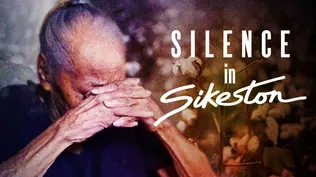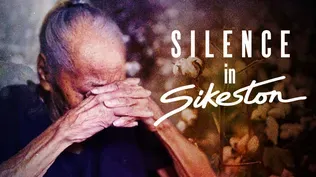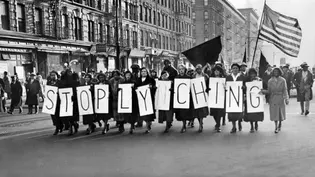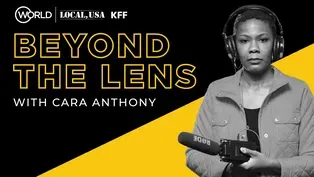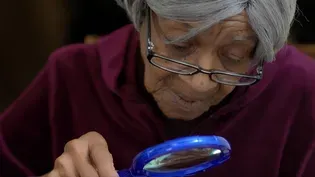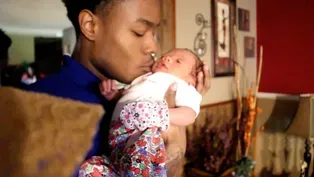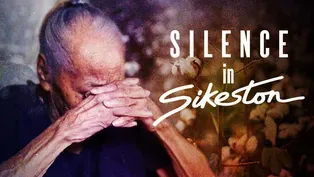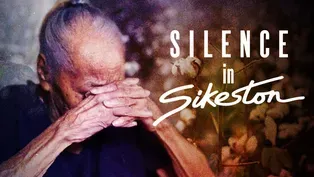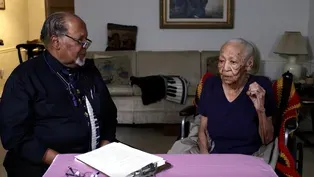
Silence in Sikeston | Meet the Makers
Clip: Season 8 Episode 12 | 16m 10sVideo has Closed Captions
A conversation about the film and podcast and what they examine and expose about silence and health.
WORLD's Chris Hastings talks with KFF Health News Midwest correspondent Cara Anthony about SILENCE IN SIKESTON. They discuss how the film and podcast examine racial violence, trauma and silence following the deaths of two Black men in one Missouri community, and exposes how the health of residents were affected. Anthony also opens up about her own family's intersection with police violence.
Funding for Silence in Sikeston provided by the Ford Foundation. Funding for Local, USA provided by the Corporation for Public Broadcasting, John D. and Catherine T. MacArthur Foundation and Wyncote Foundation.

Silence in Sikeston | Meet the Makers
Clip: Season 8 Episode 12 | 16m 10sVideo has Closed Captions
WORLD's Chris Hastings talks with KFF Health News Midwest correspondent Cara Anthony about SILENCE IN SIKESTON. They discuss how the film and podcast examine racial violence, trauma and silence following the deaths of two Black men in one Missouri community, and exposes how the health of residents were affected. Anthony also opens up about her own family's intersection with police violence.
How to Watch Local, USA
Local, USA is available to stream on pbs.org and the free PBS App, available on iPhone, Apple TV, Android TV, Android smartphones, Amazon Fire TV, Amazon Fire Tablet, Roku, Samsung Smart TV, and Vizio.
Buy Now
Providing Support for PBS.org
Learn Moreabout PBS online sponsorship(uptempo music) -[Chris Hastings] Hi everybody.
I'm Chris Hastings, Executive Producer for WORLD.
And welcome to our "Meet the Makers" series.
"Meet the Makers" is a series of conversations and interviews that we produce for YouTube, where we get to introduce you, the audience, to the makers of the films we present on WORLD.
Today I'm joined by Cara Anthony who is the Midwest Correspondent for KFF Health News, one of our partners on a film that we're gonna be presenting called "Silence in Sikeston."
(train honking) We're gonna get into "Silence in Sikeston" in a minute, but first I'm gonna introduce yo to the producer of the film, Car Cara, tell me a little bit about -[Cara Anthony] Thanks for having me, Chris.
Well, I still live in Illinois, but I have family in Missouri.
I like to tell people that I am of the Great Migration, a descendant of the Great Migrat because my parents and grandpare moved from the south to the Midwest during that period.
And so they've settled there and I've made my home there, and now I'm telling stories from there, which is great.
I've been a journalist now for about 15 years.
The last five years I've really on public health in the Midwest.
I'm from East St. Louis, Illinoi but we look at public healt issues from across the country, but particularly looking at what's going on in Illinois and Missouri, which is where this story is bas - [Chris How'd you get into health report - [Cara] That's an interesting question.
I really love telling stories about people, and so health just kind of, it aligns because we all live in we all care about our health.
Public health in particula is in the air that we breathe.
It's something that we think about all the time.
I tell people that as public health reporters, it's our job to look at the wellness of a community.
You know, what makes a community what's maybe even harming a comm what's causing death in a commun And so I look at all of the abov but it's been quite a journey getting there.
But that's what I've been doing the last five years.
- [Chris] Excellent.
So I'm gonna shift a little bit 'cause we're gonna talk about Si Give us a good summary o what "Silence in Sikeston" is.
- [Cara] Yeah, so "Silence in Sikeston" is both a film and a podcast about a small comm in the rural part of Missouri where a man named Cleo Wright was lynched in 1942.
A lot of people don't kno this, but his case was America's first federally-investigated lyn but the story largely went untol And for a long time, people in S didn't really talk about it because they were afraid to talk even though they were living under the weight of that burden.
And so we examine the silence around his case.
We also look at the case of Denz He was a young Black father who and killed by Sikeston Police in And helps us understand where we were, how we're doing, and maybe even where we're going -[Chris] In the podcast, you intentionally are reall looking at the health effects, and I'm wondering why you decide you wanted to go into the podcast in that way.
- [Cara] I really want people to that when you see a case, when you see a headline run across your news screen about another Black man being ki or another Black person being ki by the police in America, it's not just affecting that family, the victim's family, it's affecting an entire communi And racism and including violenc that can come with racism can make you sick.
It can make an entire community Communal mourning is real.
Communal grief is real.
And that's one thing that I really learned in Sikeston and it can be even harder when we cannot talk about these And so that's one of the reasons why I wanted to make sure that we looked at this as a public health story, so people understood tha these things weren't happening.
They're not isolated incidents.
They're not just happening to, a like one family or one person, but rather this can impact an entire community, and really across generations going all the way back to the lynching era, up until no - [Chris] You made a hard connec between what happened to Cleo Wr and what happened to this young man more recently.
Talk to me why you felt thos stories needed to be together.
- [Cara] These are stories about who were dealing with public health threats that were unique to the time that they were living in.
For Cleo Wright, who was the Black man who was killed in the 1940s, the public health threat of that that people really didn' wanna talk about was lynching.
For Denzel Taylor, the public health threat of his time and that we're still dealing wit is police violence and police ki And so it was really important for us to tackle both because they are deeply connecte Black people in this country are still trying to figure out how to stay safe, how to keep their family safe.
And so it was important for us to make sure that we made that modern day connection and that it wasn't just a histor because people are still living under the threat of the violence that persists to - [Chris] What is the connection between silence and trauma?
- [Cara] It's one thing to exper trauma and witness it, and witness something like a lyn watch another Black man, watch another Black person be ki by the police on camera.
It's another thing not to be able to talk about it.
And so not being able to talk ab is an added layer of pain, is an added layer of hurt that can have all sorts of healt which we explore in the podcast, And so, you know, it's like suffering in silence is not just a thing that people that is happening in real time.
People have experienced that across generations, and I think it's important for u to shine a light on those storie because it can have a real impact on everyone really.
And not only can you have mental health effects, mental anxiety, depression, stress, always being alert, always being on guard, that kind of vigilance can really weigh on your body and you can start to experience physical health effects as well.
So these are the things that people deal with across the But it's really important I think for us to look a what's happening in small towns where it's not as easy to talk about these things because you can't escape your op You can't get away from the pers or the institution that might be suffocating you.
And so it's really important for us to tell these stories in towns that are big and towns that are small because unfortunately, police violence is everywhere.
- [Chris] Let's get back to th process of covering the story.
And like I said, you've covered this for five years and there are other partners on So there's KFF Health News, and there's Retro Report.
Talk to me a little bit about the process of covering th and how did it affect you person - [Cara] I mean, covering this s really was a wake up call in a lot of ways.
If we don't tell the stories if we don't share the stories, even when they're difficult to l there are people who have challe and say, "Well, it's easier to focus on Black joy," but I make an argument that we cannot have joy without pain and the two go together.
And so it's really important for us to look at both, even when it makes people uncomf One of my favorite quotes that I came across as we were reporting this, and one of my colleagues also really leans on this is something that Jay-Z said in "The New York Times" intervie He was talking about how you can what you won't reveal.
And that really kind of became m as we pursued this story.
I'm like, of course, that makes You cannot heal what you won't r So if we don't talk about our wo if we don't talk about our trauma, then how can we heal?
How can we move on?
You know, some people might say, "Well, you know, we are the inju That is not our responsibility."
People might even challenge me, and say, "Well, as a Black journ that is not your responsibility.
You don't have to carry that wei But I say, "Yes, you know, we should be participants, we should be focusing on these n just as much as we focus on Blac and Black resilience and Black resistance."
Our pain matters too, because people are hurting, communities are hurting, unfortu Black Americans are still dying at the hands of the police.
And this is an issue that is, ag it's difficult to look at, but it's absolutely necessary for us to look at.
It was necessary for Ida B.
Wells to look at it during the lynching era.
So, you know, if she looked at it and lived through it, certainly I can too.
- [Chris] Let's talk a little bit about the differences between the film and the podcast So the film, which is directed by Retro Report, is marketably different than the Can you walk me through wha you think the differences are?
- [Cara] Yeah, so it was really to share this story all differen You know, there's a film, there's a podcast, and there is an essay where I dive deep into my family And so the director of the film, Jill Rosenbaum, really made it clear that she wanted the residents of to tell their own story.
And so you might see them talking in clusters, in one particular interview, a lynching witness is being inte by her granddaughter, which is unique and a special way to tell the story.
In the podcast though, I kind of come in there a little and we talk about public health, we talk more about my family sto what happened to my uncle, my great uncle was killed by the like early tape from when I first went to Sikeston, and my first trip to Sikeston wa I didn't have a camera crew, it was just kind of like me and a recorder.
And so you'll hear some of those early interactions that I had with Sikesto residents as I started to realiz how big the story was in this really small town.
And all these things started to be revealed.
And I thought, "There's somethin there's something going on here.
And we had no idea that it was America's firs federally-investigated lynching, but as time went on, I started to learn more.
And so in the podcast you'll hea like more about the public healt how racism can make you sick, how racial violence can make you how to talk about it with your family members.
You know, I've had tough conversations with my father, I'm even trying to figure out ho to my seven-year-old daughter already about these things.
And one thing that I really cher is just like being able to have kind of a template to have a conversation with her.
And I hope that other peopl feel inspired by that as well.
- [Chris] How has this film affe - [Cara] I would say this film has taught my family about the importance of sharing You know, in the film, you get to meet two lynching witnesses who are now gone, they were the matriarchs of thei and they're no longer with us.
And we're glad that we wer able to capture those stories.
And I think that made us really at what stories are we not telling that we should tell?
What stories should we preserve?
My parents are of a generation where you just did not talk about racial violence.
You did not talk about lynching, you did not talk about your trauma, your pain.
You just said, like, "Everything We move on, we go forward."
And so they really had some tough questions about the why I wanted to do thi my motivations for this whole pr And so I really explained to the that it needed to be done because even though it was diffi and made people maybe even uncom is an absolutely necessar story to listen to and to watch.
(soft music) - [Rhonda Council] This is a tow of roughly 17,000 people.
And if I had to take a rough guess how many Blacks here, 6,000 probably.
It's not a whole lot, but it's e - [Cara] Racism is still making whether we wanna talk about it or not, right.
I can still, you know, I live in a relatively small tow I still feel sometimes that record scratch effect when I walk into a restaurant.
You know what I mean?
It's like, even if we're not tal about something as much, even if people feel jaded, it doesn't mean that it's not ha You know, Black Americans are still being gunned down by police officers.
People are still witnessing and trying to figure out how to and be Black in America.
And I think it's like, it's still a huge issue even if the news cycle changes.
And so as a journalist, it's really important for me to kind of stay focused and stay on mission because we know that the problem it's still a problem.
- [Larry McClellon] They say rig that we've come a long way, but we haven't really came a lon - [Chris] Cara Anthony, Midwes Correspondent for KFF Health New and the producer of the film "Silence in Sikeston" which is playing across WORLD Channel's platforms.
Thank you for being here today.
- [Cara] Thanks for having me, C - [Tina Martin] Listen to the companion podcast hosted by "Silence in Sikeston" producer, Cara Anthony.
Cara breaks the silence on what causes cycles of trauma using insights from history, public health, and personal stories.
(uptempo music)
Silence in Sikeston | Before Lynching Became a Crime
Video has Closed Captions
Before the death of Cleo Wright in 1942, lynching was never prosecuted as a federal crime. (56s)
Silence in Sikeston | Beyond the Lens with Cara Anthony
Video has Closed Captions
Journalist Cara Anthony reveals a piece of family history that parallels SILENCE IN SIKESTON. (8m 12s)
Silence in Sikeston | In the Aftermath of Trauma
Video has Closed Captions
Sikeston residents share how they had to live following the lynching of Cleo Wright. (56s)
Silence in Sikeston | Love & Grief for a Young, Black Father
Video has Closed Captions
A mother talks about her son's life in Chicago and Sikeston, MO before his death by police. (59s)
Video has Closed Captions
How a lynching and police killing 78 years apart haunt the rural community of Sikeston, Missouri. (30s)
Video has Closed Captions
How a lynching and police killing 78 years apart haunt the rural community of Sikeston, Missouri. (1m 17s)
Silence in Sikeston | Witnesses to a Lynching
Video has Closed Captions
Two residents recall the day they, as young children, witnessed the lynching of Cleo Wright in 1942. (59s)
Providing Support for PBS.org
Learn Moreabout PBS online sponsorshipFunding for Silence in Sikeston provided by the Ford Foundation. Funding for Local, USA provided by the Corporation for Public Broadcasting, John D. and Catherine T. MacArthur Foundation and Wyncote Foundation.
